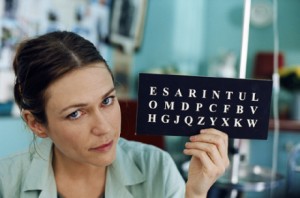While cleaning out the garage this weekend I found my graphing calculator from high school. I believe it was a TI-83+. Some serious math was attempted on that, though more often it was a poor mans Game Boy. Before every high school student had an iPhone and other gadgets, this was the most sophisticated device anyone would bring to school.
One day in math class, after mumbling a wise crack at the expense of someone next to me, in retaliation he attempted to take my precious TI-83+ away from me. Due to having the right leverage, and certainly not due to strength I was able to get the calculator back from him. In the process, with his ape-like strength grab, the screen received a big ink spot on it. I was still able to see the numbers behind the ink, but this was frustrating that the most expensive thing I owned had a visual bruise. I was upset about it, but there wasn’t really anything I could do.

(My calculator looked similar)
A few weeks later, while about to switch out books at my locker between classes, I found my locker door open already. I knew enough to assume that someone wasn’t doing me a kindness and saving me time by opening my locker for me. I hoped I forgot to closed it, but feared someone broke into it.
Searching through my stuff, I found my prized TI-83+ calculator was missing. Gone, baby, gone. On top of that, the thief stole the bag lunch my Mom packed for me. Who does that? I understand the calculator, but stealing a bag lunch is borderline psychotic.
When filing a report with the school office, they asked if the calculator had any identifying markings on it. I told them my last name was engraved on the back and then *bingo* it hit me that the screen was damaged. I told them about the ink thumb print that was on it. Out of over 1,000 calculators in the school, mine was unique with that visual stain. I’d never seen a calculator like it.
Two days later, a teacher found a student using my calculator. Without that thumbprint, which I initially hated, my calculator would have surely been lost forever without a massive lockdown and witch hunt to inspect every kid in school.
Was it a bad thing that my calculator was damage? It was… until it saved me.
The rapper 50 Cent was two few weeks away from releasing his debut record on a major label when he was shot 9 times, including one bullet going through his jaw. After pouring a year into recording the album, Columbia Records canceled the release, dropped him from the label, and 50 Cent found himself blackballed from all other major labels, not wanting to associate themselves with the violence.
With no money, no label, and being told by an executive that he’d have to wait at least two years before trying to get back in the industry, getting shot was surely the worst thing that happened to him.
Or was it?
Instead of being giving up due to all of the negative forces coming at him, he channeled them into something positive.
The bullet that went through his jaw changed his voice. It now had a hiss and forced him to rap slightly slower. With no label, he pushed his lyrics farther and didn’t have to water anything down. Getting shot 9 times and not dying also helped give him immediately credibility and almost made him into a myth. Without money from a major label to distribute his music, he encouraged people to pirate and spread his music, which is exactly what happened. Feeling as though he was at the bottom with nothing to lose, he poked fun at the industry and popular songs on the radio. With a major label behind him, he would have been hesitant to do this, but now it resonated with his audience. The momentum kept building.
The result of his mix tape campaign was that he was signed to Eminem and Dr. Dre’s label. He then went on to become very successful in music and business (making $100 million from his investment in Vitamin Water).
Most things in life are neutral. What makes them “good” or “bad” is perspective and how you approach them. No one enjoys going through difficult times, but those are the events people are changed by. Steve Jobs likely wouldn’t have been as successful with Apple if he wasn’t fired. The forced separation gave him a new perspective and also made him a much better manager. Apple, along with several other massive companies were started in recessions.
The temptation to blame external forces and turn things into a negative is that they give you an alibi. If you’re always at the mercy of outside forces, then you always have someone to blame when things don’t go as well as you planned. And if you watch the news, there is always something wrong. There is always blame that could be cast somewhere. But whatever you’re trying to do, there are likely people who have already done it in worse conditions. A lot of people want to write a book and almost as many find some excuse to not do so. The terrific book The Diving Bell and the Butterfly was written by a man with locked-in syndrome with the help of someone who pointed at each letter in the alphabet and he’d blink when she stopped on the correct one. He had the best excuse I’ve heard of to not write a book, yet he did it. He channeled his car accident and paralysis into writing a beautiful memoir on life and death.

The next time you feel yourself suffering from a lack of resources, creativity, opportunity, or a thousand other things, perhaps the one thing you’re missing is the right perspective.

Ben–I really enjoyed reading this article. Thanks for sharing it. It’s taken me a while to discover that sometimes, losing things gives me a whole new freedom. When I don’t care about the consequences or outcomes of something that I do, I find it gives me a new outlet for expressing myself. It brings me closer to who I truly am rather than what I feel like I must project in order to confirm to requirements or expectations. What some people would view as a loss, such as what happened to Fiddy, the brave view as the removal of a shackle.
Great comment. I’ve recently come to believe most of life is ruled by paradox. By losing certain things, you can gain more freedom. By not investing so much attention in what others are going to think, in turn they often care more about the work you make.
I forgot about this when I wrote the post, but the book “The Art of Learning” also talks about channeling what comes at you into something positive. If he tried to reject the possible negative things that happened when he was playing chess or Tai Chi, he’d find himself distracted and losing focus. Instead he had to shift viewing the distractions in a positive way and use them to his advantage.
Reminds me of James Altucher’s post about negativity: http://www.jamesaltucher.com/2011/07/the-power-of-negative-thinking/